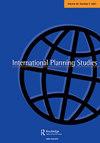Prioritizing behaviour alongside regulations in Amsterdam’s planning projects
IF 1.5
Q4 REGIONAL & URBAN PLANNING
引用次数: 1
Abstract
ABSTRACT Project-specific actor constellations and relationships shape contemporary planning practice. The existing literature predominantly focuses on the flexibility of regulations in planning projects and largely ignores the behaviour of involved governance actors. Here, we argue that the nuances of relationship dynamics between public and private sector actors deserve increased scrutiny. Based on in-depth interviews with public planners and project managers, and private developers and investors involved in Amsterdam’s urban development, and a case study of a major redevelopment project, we have coined a new term: ‘behavioural flexibility’. Behavioural flexibility highlights how relationships extensively affect how actors trust and communicate with one another, and how their goals align. Combined, these factors strongly impact planning outcomes as they determine how actors eventually behave in projects by either being supportive and constructive or unhelpful and obstructive. The findings call for an assessment of ‘indicative actor relationships’ as an alternate starting point for planning projects.在阿姆斯特丹的规划项目中,将行为与法规放在首位
项目特定的演员星座和关系塑造了当代规划实践。现有的文献主要关注规划项目中法规的灵活性,而在很大程度上忽略了相关治理参与者的行为。在这里,我们认为公共和私营部门行为者之间关系动态的细微差别值得加强审查。基于对参与阿姆斯特丹城市发展的公共规划师、项目经理、私人开发商和投资者的深入采访,以及对一个重大重建项目的案例研究,我们创造了一个新的术语:“行为灵活性”。行为灵活性强调了关系如何广泛地影响参与者之间的信任和沟通,以及他们的目标如何一致。综合起来,这些因素强烈地影响规划结果,因为它们决定了参与者最终在项目中的行为,要么是支持和建设性的,要么是无益的和阻碍的。研究结果呼吁对“指示性行为体关系”进行评估,作为规划项目的另一个起点。
本文章由计算机程序翻译,如有差异,请以英文原文为准。
求助全文
约1分钟内获得全文
求助全文
来源期刊

International Planning Studies
REGIONAL & URBAN PLANNING-
CiteScore
4.60
自引率
4.80%
发文量
20
期刊介绍:
Planning, at urban, regional, national and international levels, faces new challenges, notably those related to the growth of globalisation as both an objective socio-economic process and a shift in policy-maker perceptions and modes of analysis. International Planning Studies (IPS) addresses these issues by publishing quality research in a variety of specific fields and from a range of theoretical and normative perspectives, which helps improve understanding of the actual and potential role of planning and planners in this context.
 求助内容:
求助内容: 应助结果提醒方式:
应助结果提醒方式:


